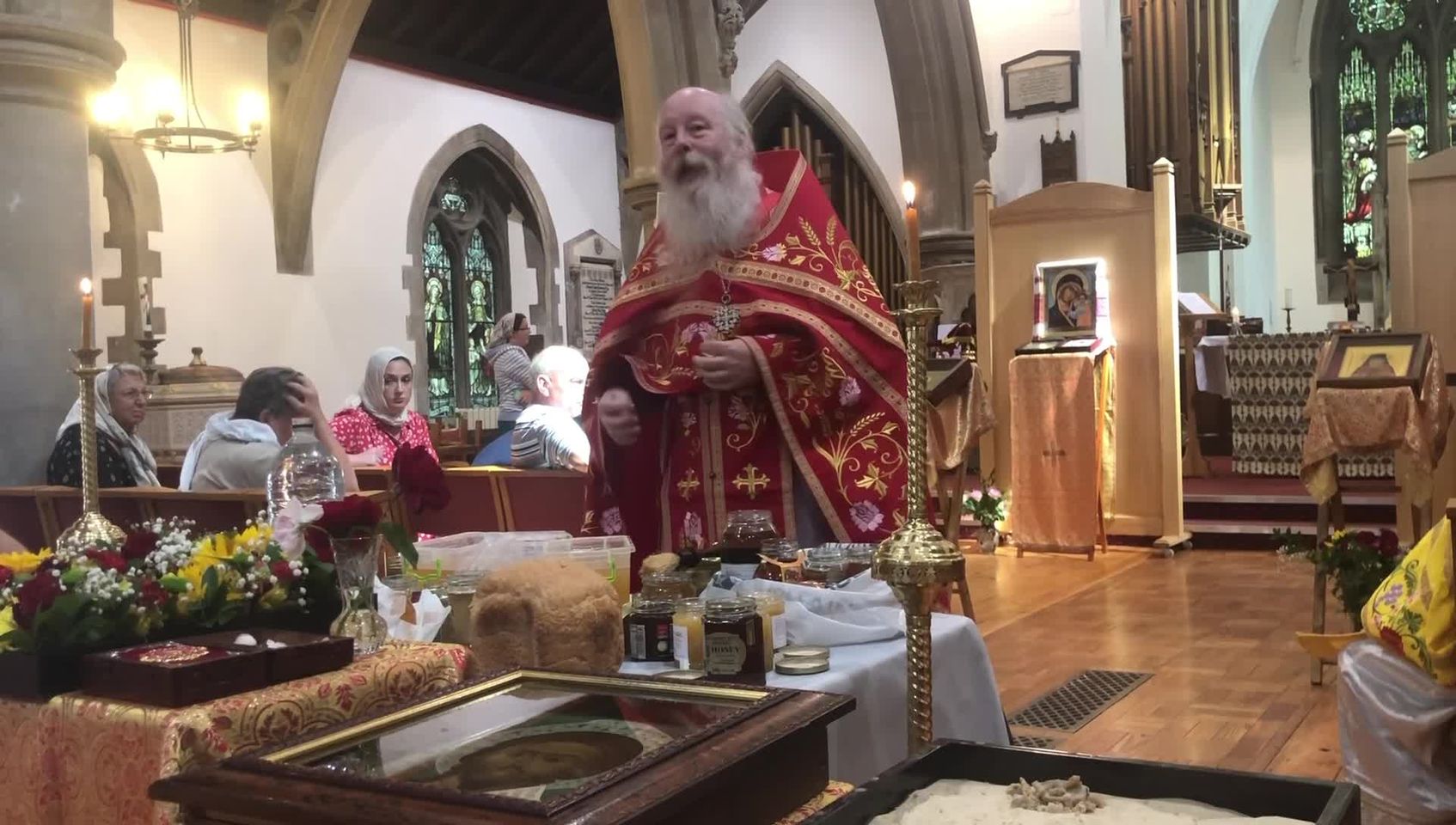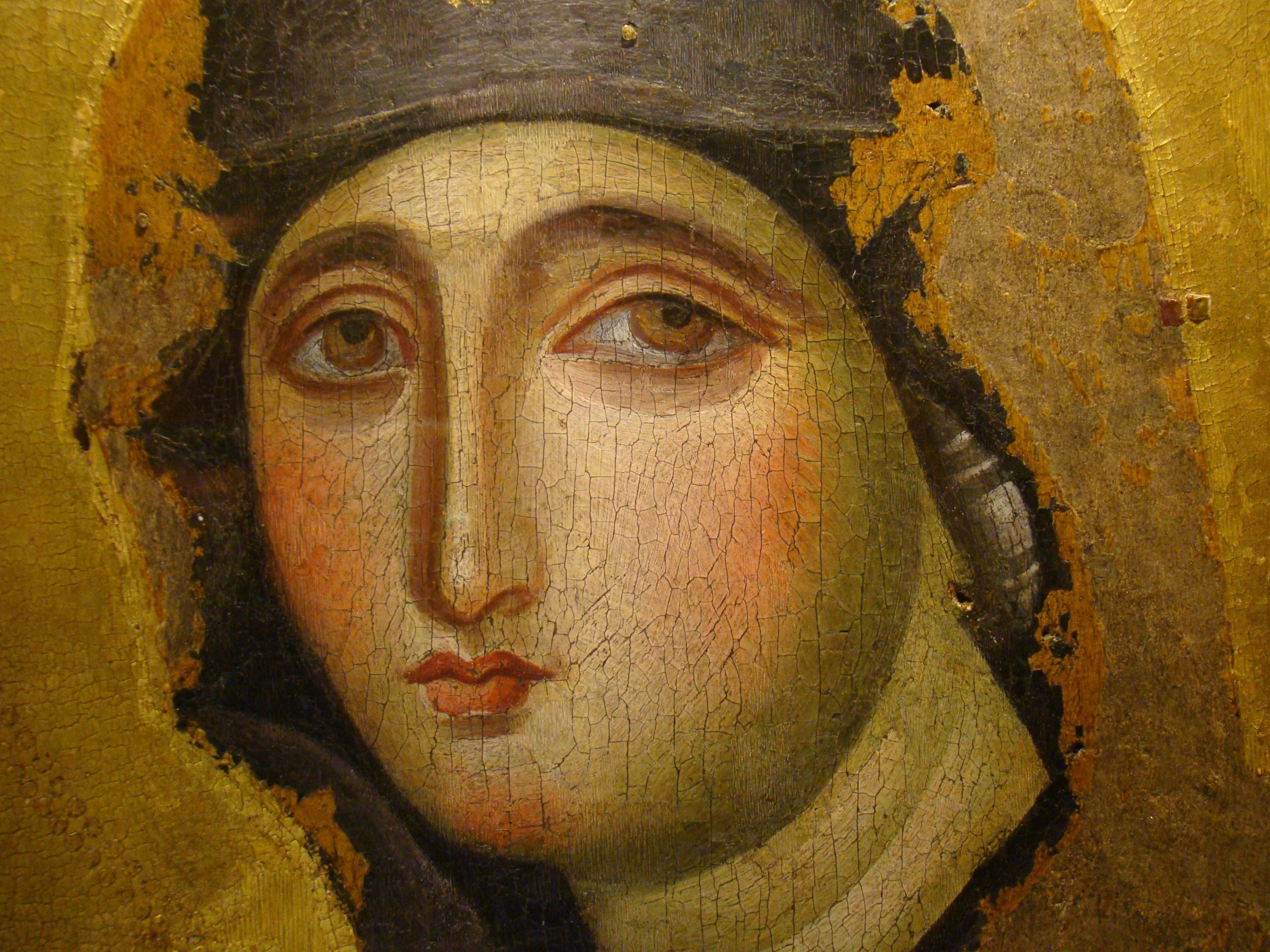With this evening’s services, the Church returns to tone 1 of the Octoechos, starting the eight tone cycle again.
The core daily variables of services for the week will be drawn from the tone 1 texts, until we change tones with the first services for the Lord’s Day, starting with next Saturday’s vespers.

On Saturday evening of Tone I, at Compline: Canon of Supplication to the Most Holy Theotokos
Ode1, Irmos: Having been delivered from bitter slavery, * Israel traversed the impassable as though dry land; * and beholding the enemy drowned, * they chanted unto God as to their Redeemer, * Who worketh wonders with His upraised arm, * for He hath been glorified.
Most Holy Theotokos, save us.
Praising thee, О Queen of all, the captains of the angelic ranks were filled with awe and fear, and every mind, because of thy goodness, hymneth thee as the Mother of the Creator; for thou hast surpassed every form of laudation, having given birth to Christ.
Most Holy Theotokos, save us.
Troubled by grievous temptations and afflicted by mine enemies, wretch that I am, I cry out, weeping: Stretch forth thy hand to me from on high, О thou who art exceeding rich, delivering me; and by thy supplications grant that I may live free from danger.
Glory be to the Father, and to the Son, and to the Holy Spirit.
With the balm of thy tender compassion heal thou the secret transgressions of my soul, and calm the assaults of my flesh, О Theotokos; and, turning back the spears and darts of the enemy upon them, do thou mightily pierce their hearts.
Now & ever, and unto the ages of ages. Amen.
Thy virginal womb which gave birth to Christ hath destroyed the ancient pasture of the slayer of mankind; wherefore, all creation now rejoiceth, О most pure one, having been restored to life, with one accord hymning thy Son and God.
Ode III, Irmos: Let no mortal boast in his wisdom or wealth, * but rather in his faith in the Lord, * crying out to Christ God in an Orthodox manner, * ever chanting: do Thou Establish me O Master, * upon the rock of Thy commandments!
Most Holy Theotokos, save us.
Once, the great Jacob, sleeping on the way, and beholding angels descending from on high to the earth by a ladder, marvelled, О Virgin; and, having awakened, he clearly described thee beforehand as the portal of heaven.
Most Holy Theotokos, save us.
Cast into misfortune by temporal restraint, wretch that I am, and beset by perilous tempests, I cry aloud: Woe is me! О thou who gavest birth to God and hast lifted up our horn, save me by thy supplications!
Glory be to the Father, and to the Son, and to the Holy Spirit.
Stretching forth thy mighty hand from heaven, О Christ, King of all, put Thou the heads of the enemies, perceptible and noetic, under the feet of those who with faith proclaim Thy Mother to be the Theotokos, О my Jesus.
Now & ever, and unto the ages of ages. Amen.
Isaiah, of old, purified by the burning coal of the Spirit, cried out that a Son would manifestly be born of thy womb, О Virgin who art exceeding rich, and to Whom in latter times thou hast given birth without a man for my sake.
Ode IV, Irmos: Of old, Habbakuk heard wondrous report of Thee O Christ, * and cried aloud in fear: * God shall come forth from Theman, * the Holy One from the mountain overshadowed and densely wooded, * to save His anointed ones! * Glory to Thy power, O Lord!
Most Holy Theotokos, save us.
Thee, О Mother of God, hath the ruler of the world described beforehand as comely and all-honoured among women, as coming up from the wilderness, and bearing Christ, thine Offspring, in thine arms; and he cried: Glory to Thy power, О Lord!
Most Holy Theotokos, save us.
Incline thine ear unto me, О good one, behold mine oppression and the increase of my tribulations! For, lifting up the eyes of my soul to thee, О Lady, and bending my knees as I weep, I now pray, crying: Bring an end to the turmoil of my temptations!
Glory be to the Father, and to the Son, and to the Holy Spirit.
Knowing thee to be an unassailable rampart, moved to entreaty, I, thy servant, now flee to thee, and I reckon the missiles of the enemy as impotent as the darts of children, О thou who art exceeding rich. Wherefore, rejoicing, I cry: Glory to thy birthgiving, О Mother of God!
Now & ever, and unto the ages of ages. Amen.
The power of the Most High overshadowed thee with the visitation of the divine Spirit, О Virgin, and then, beyond nature, the Lord of all, having endowed flesh and soul with life, united them to Himself, bringing life thereto and remaining in the same nature.
Ode V, Irmos: Do Thou shine forth O Christ Thy never-waning light * upon the hearts of those who hymn Thee with faith, * granting us peace beyond understanding; * Wherefore by Thy light we flee the night of ignorance * coming unto the day, * glorifying Thee O Lover of mankind.
Most Holy Theotokos, save us.
Once, foreseeing thee, О all-hymned one, as a divine, unquarried mountain, Daniel manifestly cried aloud: From thee let the Stone of divine generation be cut: Christ, the Saviour of the world! Honouring Him now, we the faithful praise thee, О Bride of God.
Most Holy Theotokos, save us.
I have fallen under many dangers, wretch that I am, and, praying with pain of heart and weeping, I, thy servant, cry out unashamedly: О Birthgiver of God, deliver my lowliness from besetting pains, and fill me with gladness!
Glory be to the Father, and to the Son, and to the Holy Spirit.
Calm the raging sea of my passions by thy mighty supplication, О good one who hast given birth to Christ without suffering, that, living now in tranquillity of soul, I may praise thee in hymns for the rest of my life.
Now & ever, and unto the ages of ages. Amen.
Tell me: how bearest thou God in thine arms; and how dost thou give suck to Him Who holdeth all things in His hand, О all-blessed Virgin? And she said: “Having given birth unto Christ God, I remain pure, taking away the debt of Adam and our first mother!”
Ode VI, Irmos: I am held fast in boundless passions, * and have fallen into the sea-monster of evil; * but do Thou lead me up from corruption O God, * as once Thou didst Jonah, * and by faith grant me dispassion, * that I may offer a noetic sacrifice of praise and salvation * unto Thee.
Most Holy Theotokos, save us.
Without departing from His place in the bosom of the Father, the pre-eternal Son rested in the bosom of His Mother. He, Who with the Father is before the ages, hath in latter times issued forth from the womb of the Virgin, leading all up to life immortal in His ineffable goodness.
Most Holy Theotokos, save us.
Bound through malice by the chains of the enemy, I have been cast down to the bars of hell. Woe is me! Yet, appearing from heaven, О pure divine Maiden, stand thou before me, thy servant, raising me up by thy supplications, and grant a helping hand to me who hymn thy divine birthgiving.
Glory be to the Father, and to the Son, and to the Holy Spirit.
Wretch that I am, I have fallen into the pit of destruction, and many wild beasts surround me; yet, deflect their assaults by thy supplications, as with stones, О Lady, and keep thy servant unharmed; for thou didst bear in thy womb Christ, the Chief Cornerstone.
Now & ever, and unto the ages of ages. Amen.
Of old, the choir of the divine prophets proclaimed the images of thy birthgiving, О Virgin, calling thee the radiant cloud, the lampstand, the jar, the table, the dew of heaven, the bread, the manna and the door, the throne and the palace, the rod and paradise, in that thou hast given birth to Christ.
Lord, have mercy. (Thrice).
Glory be to the Father, and to the Son, and to the Holy Spirit; now & ever, and unto the ages of ages. Amen.
Sessional hymn, Tone I: Fleeing with love for thy goodness, we all know thee to be the Mother of God, who wast truly revealed as a virgin even after giving birth; for we sinners have thee as our intercessor, and we have acquired thee as our salvation amid misfortunes, the only all-immaculate one.
Ode VII, Irmos: Having passed through the unbearable flame of the furnace * as though it were a bridal-chamber, * the children who for the sake of piety, * were revealed as holy * chanted together, singing the hymn: * O God of our fathers, blessed art Thou!
Most Holy Theotokos, save us.
The Pre-eternal One, passing through thine impassable doors, О Queen of all, preserved the tokens of thy virginity pure and intact, even after giving birth. Wherefore, we cry aloud: О God of our fathers, blessed art Thou!
Most Holy Theotokos, save us.
Cast into the furnace, I am consumed by the sevenfold flames of soul-slaying perils; yet do thou thyself rain down dew upon me by thine entreaties, О good Lady, that I may cry: Blessed is the God of our fathers!
Glory be to the Father, and to the Son, and to the Holy Spirit.
Having grown old through the passions, through unremitting misfortunes and tribulations, and having reached the sunset of my life devoid of the virtues and devoured by slothfulness, I cry to thee, О Lady: О consolation of mortals, have mercy on me!
Now & ever, and unto the ages of ages. Amen.
Worshipping the Trinity in Unity in an Orthodox manner, and proclaiming thee, О pure Virgin Mother, to be the one who gave birth to God in the flesh, in a godly manner we mortals chant: О God of our fathers, blessed art Thou!
Ode VIII, Irmos: The furnace moist with dew * was an image and prefiguring of a wonder past nature, * burning not the Children whom it had received, * so the fire of the Godhead consumed not the Virgin’s womb * into which it had descended. * Therefore in song let us sing: * Let the whole creation bless the Lord * and supremely exalt Him throughout all ages.
Most Holy Theotokos, save us.
The supremely true word of the priest prefigured thy birthgiving, О Virgin; for thou didst truly give birth to the Word of God, and thy womb, through which God passed, He did not rend apart. Wherefore, rejoicing as is meet, with one accord we hymn thee, the Theotokos, as is due, and exalt thee, the pure one, throughout all ages.
Most Holy Theotokos, save us.
With divine fire burn up the uncultivated thorns which have grown up in my soul, О most pure one, and by thy supplications raise me up to the virtues, that I may bear fruit for Christ; for the ever-living Flower, having sprung forth from thee, hath adorned all creation. Wherefore, we honour thee, the pure Theotokos, throughout all ages.
Glory be to the Father, and to the Son, and to the Holy Spirit.
Quickly and painlessly grant me healing amid evils, О Birthgiver of God; for, having fallen into afflictions and perils, wretch that I am, I invoke thy quickness to help, lamenting. Wherefore, О most pure one, hasten thou to rescue me and save me from every torment, that, blessing thee, I may hymn thy birthgiving.
Now & ever, and unto the ages of ages. Amen.
Of old, the rod of Aaron that budded forth prefigured thee, О Virgin; for, budding forth, thou alone hast given birth without a man, having now received the Rain of heaven in thy womb. Wherefore, in gladness we hymn thee, the Theotokos, as is due, and supremely exalt thee throughout all ages.
Ode IX, Irmos: Ineffable is the mystery of the Virgin: * for she is heaven and the throne of the cherubim, * and hath been revealed as the radiant bridal-chamber * of Christ God Almighty. * Wherefore we piously magnify her as the Theotokos.
Most Holy Theotokos, save us.
Most glorious is the mystery of the Virgin! For Him Whom the vast spaces above the heavens could not contain was contained within her womb. Wherefore, assembling, we call her blessed, and in gladness we magnify her with faith.
Most Holy Theotokos, save us.
Seeing thee alone as higher than the heavens, the radiance of God, the throne of the cherubim and the bridal chamber, the holy couch, О undefiled one, we mortals, praising Christ our God, magnify Him to Whom thou hast given birth through thy pure loins.
Glory be to the Father, and to the Son, and to the Holy Spirit.
Round about me are many afflictions; and evil misfortunes, sickness and grievous sins, now assailing me, have cast me into the pit. Wherefore, in the bitterness of my soul, I pray: О most holy Theotokos, find deliverance for me!
Now & ever, and unto the ages of ages. Amen.
Through the entreaties of the pure divine Maiden, О Christ, bring peace to the world, casting the power of the enemy down beneath the feet of the faithful and, establishing unutterable tranquillity thereby, preserve it throughout all ages.
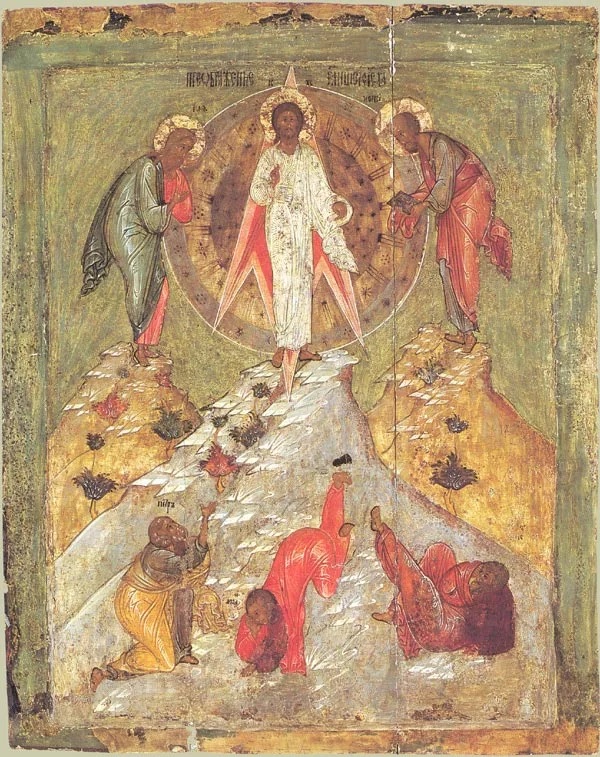


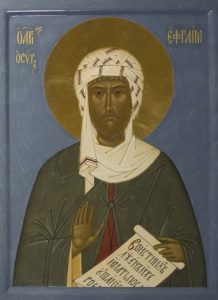
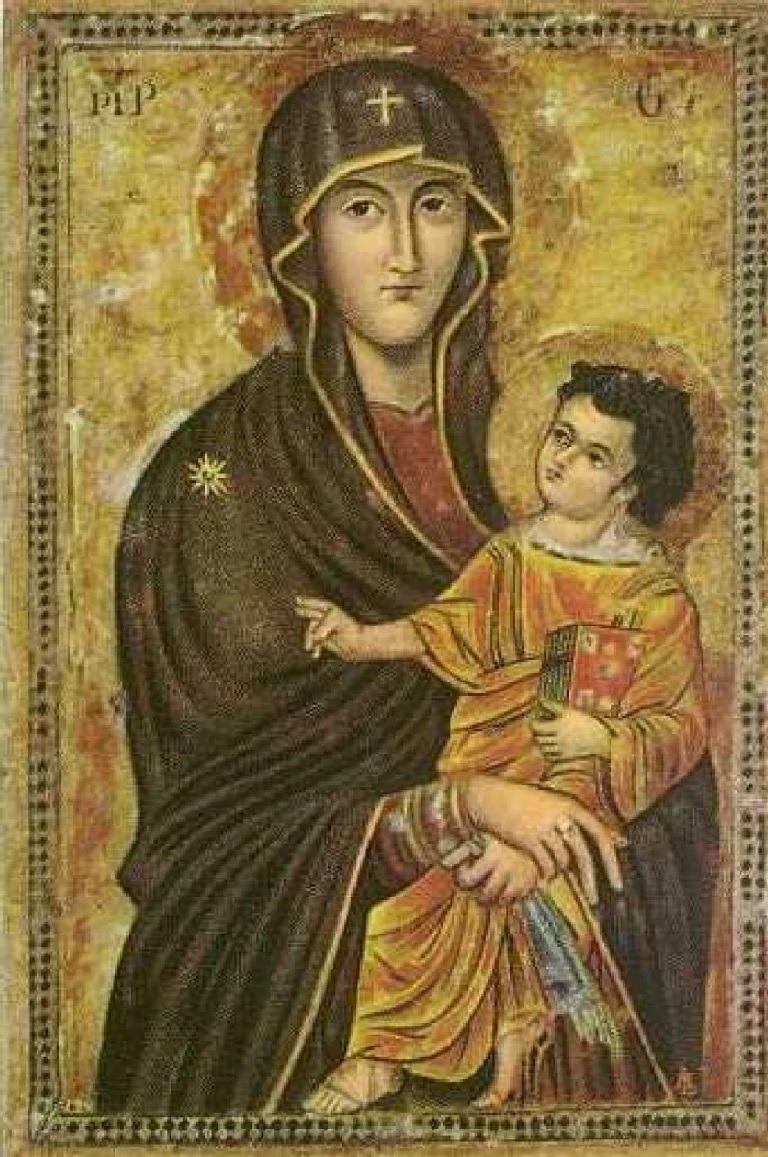 Further to my encouragement to pray the supplicatory canons to the Theotokos as part of the praxis of the Dormition Fast, the canon for compline for Wednesday of tone 8 is posted, below.
Further to my encouragement to pray the supplicatory canons to the Theotokos as part of the praxis of the Dormition Fast, the canon for compline for Wednesday of tone 8 is posted, below. 